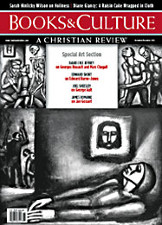Updating the Faith?
Sunday afternoon, with the morning’s worship service fresh in my mind, I read Alan Padgett’s review of three books concerned with the essence of Christianity [“Updating the Faith?“, July/August]. I go to the church where I grew up. Then again, I don’t. The Bible is still authoritative there, though only a few from the old guard pack one; the creedal doctrines are the litmus test, but pop psychology has neutralized the pH of the sermons; mission is integral, but gone are the week-long conventions welcoming home, like heroes on furlough, a parade of colorful, culturally cross-dressed missionaries with their fascinating stories and curios; we still have a choir (no, not with robes), but they mostly open for the rock band that lately has added searchlights and fog to give worship that eerie feeling it’s been missing (don’t get me started on the cotton candy choruses vs. the meaty classics—suffice it to say they cater to the sweet tooth).
You’ve guessed all this is not my cup of tea (did I mention the lattés in the service?). What’s more, the sea change in my experience of church has been embraced by my pastors, studiously attired in faded jeans and untucked, rumpled shirts. But they’re symbolically attired too I think, as if to suggest the core of the gospel—what remains when our precious practices and points of view (no irony intended) are stripped off like clothes.
Hung naked himself on a cross in broad daylight (while his executioners gambled for his garment as if to suggest “the essence of heresy” as a kind of pornography of the spirit that exploits its nakedness), the resurrected Christ reminds his would-be followers: “you are wretched, pitiful, poor, blind and naked … buy from me … white clothes to wear, so you can cover your shameful nakedness”—no minced words, no frills, pretty close to the essence.
Bruce Jespersen 6 Mckenzie Lake Green S.E. Calgary, Alberta CanadaBreathing Eden’s Air
I was pleased to find the positive review of Abraham Kuyper’s Wisdom and Wonder: Common Grace in Science and Art by an eminent artist like Makoto Fujimura, and that Kuyper has been of great help to him [“Breathing Eden’s Air,” July/August]. And yet I wish that the review had provided the reader with more information about Kuyper and his work.
At the end of Kuyper’s three-volume work De Gemeene Gratie [“Common Grace” (Leiden & Amsterdam, 1902-1905)], there is appended a booklet of 87 pages devoted to “Common Grace in Science and Art.” I assume it is this appendix, plus some selections from the rest of the trilogy, which provides the Dutch source for Wisdom and Wonder. But readers of Fujimura’s review never learn that Kuyper devoted some 1,753 pages to common grace in this work. Sadly, after more than a century, English readers still do not “hold in their hands” a translation of Kuyper’s great work on common grace. We have only a small fraction of it.
Raymond Van Leeuwen Ardmore, PennsylvaniaHabits of the Heart & Mind
Reading “Habits of the Heart & Mind” [Jesse Covington, Maurice Lee, Sarah L. Skripsky, and Lesa Stern, July/August], I found myself taken aback by all of the false dichotomies: Christian practices vs. “traditional academic elements” and “academic habits,” “modest sacrifices of previously assigned texts,” “sacrificing academic content for faith-learning integration.” Since when did academic habits cease to be Christian habits, or traditional pedagogies Christian pedagogies? If David Smith is right, that “[p]ractices are Christian insofar as they are ‘resonances’ of God’s engagement with the world,” and if God really is engaged in all facets of his world (academic habits included), then why the need to sacrifice or supplement? God can already be known and worshipped via the rational cognition of geophysical realities of our planet, through the iconic experiences of truth and beauty in the arts, or through the parabolic wisdom of history. Study the universe, and the habit of silence will naturally result. Surely God inhabits the thoughtful, creative, and accurate discipline of truth presentation already practiced by professors. Surely times of questioning and answering, and reading and writing, are already inhabited by God. Perhaps all we really need to do is wake students up to these facts.
John Van Sloten Pastor, New Hope CRC Calgary, Alberta CanadaCopyright © 2012 by the author or Christianity Today/Books & Culture magazine.Click here for reprint information on Books & Culture.










